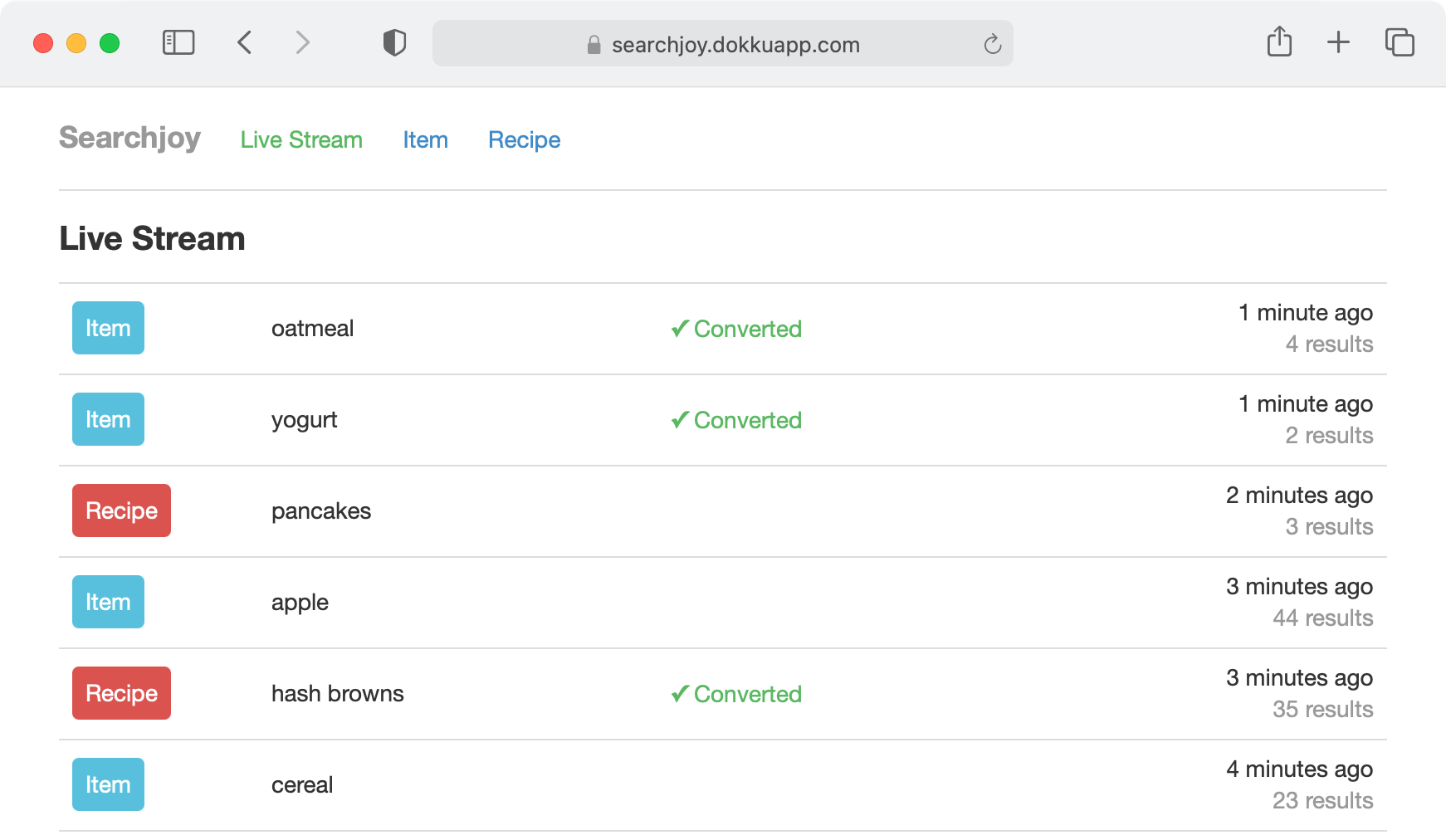ankane / Searchjoy
Programming Languages
Searchjoy
Search analytics made easy
- view searches in real-time
- track conversions week over week
- monitor the performance of top searches
Works with any search platform, including Elasticsearch, Sphinx, and Solr
💘 An amazing companion to Searchkick
Installation
Add this line to your application’s Gemfile:
gem "searchjoy"
And run the generator. This creates a migration to store searches.
rails generate searchjoy:install
rails db:migrate
Next, add the dashboard to your config/routes.rb.
mount Searchjoy::Engine, at: "searchjoy"
Be sure to protect the endpoint in production - see the Authentication section for ways to do this.
Track Searches
Track searches by creating a record in the database.
Searchjoy::Search.create(
search_type: "Item", # typically the model name
query: "apple",
results_count: 12,
user_id: 1
)
With Searchkick, you can use the track option to do this automatically.
Item.search("apple", track: {user_id: 1})
If you want to track more attributes, add them to the searchjoy_searches table.
add_column :searchjoy_searches, :source, :string
Then, pass the values to the track option.
Item.search("apple", track: {user_id: 1, source: "web"})
It’s that easy.
Track Conversions
First, choose a conversion metric. At Instacart, an item added to the cart from the search results page counts as a conversion.
Next, when a user searches, keep track of the search id. With Searchkick, you can get the id with:
results = Item.search("apple", track: true)
results.search.id
When a user converts, find the record and call convert.
search = Searchjoy::Search.find(params[:id])
search.convert
Better yet, record the model that converted.
search.convert(item)
Authentication
Don’t forget to protect the dashboard in production.
Devise
In your config/routes.rb:
authenticate :user, ->(user) { user.admin? } do
mount Searchjoy::Engine, at: "searchjoy"
end
Basic Authentication
Set the following variables in your environment or an initializer.
ENV["SEARCHJOY_USERNAME"] = "andrew"
ENV["SEARCHJOY_PASSWORD"] = "secret"
Data Retention
Data should only be retained for as long as it’s needed. Delete older data with:
Searchjoy::Search.where("created_at < ?", 1.year.ago).in_batches.delete_all
You can use Rollup to aggregate important data before you do.
Searchjoy::Search.rollup("Searches")
Delete data for a specific user with:
Searchjoy::Search.where(user_id: 1).delete_all
Customize
To customize, create an initializer config/initializers/searchjoy.rb.
Change the time zone
Searchjoy.time_zone = "Pacific Time (US & Canada)" # defaults to Time.zone
Change the number of top searches shown
Searchjoy.top_searches = 500 # defaults to 100
Link to the search results
Searchjoy.query_url = ->(search) { Rails.application.routes.url_helpers.items_path(q: search.query) }
Add additional info to the query in the live stream
Searchjoy.query_name = ->(search) { "#{search.query} #{search.city}" }
Show the conversion name in the live stream
Searchjoy.conversion_name = ->(model) { model.name }
Contributing
Everyone is encouraged to help improve this project. Here are a few ways you can help:
- Report bugs
- Fix bugs and submit pull requests
- Write, clarify, or fix documentation
- Suggest or add new feature
To get started with development and testing:
git clone https://github.com/ankane/searchjoy.git
cd searchjoy
bundle install
bundle exec rake test

